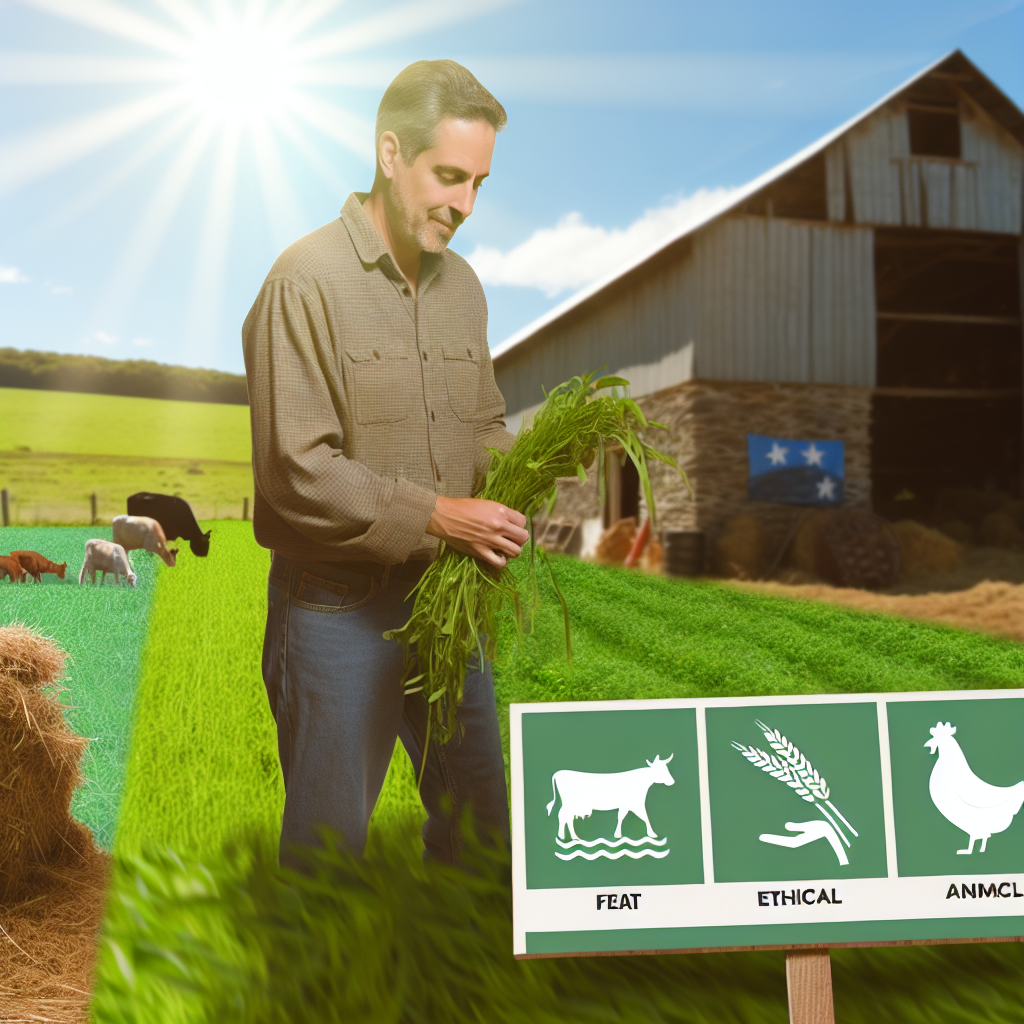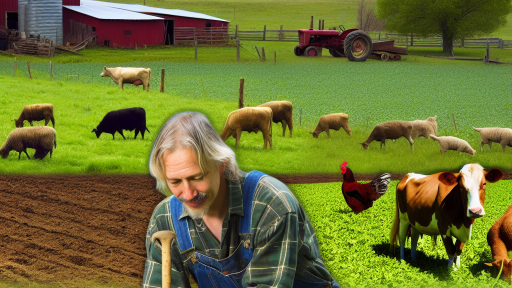Understanding Ethical Farming
Core Principles
Ethical farming focuses on sustainability and responsibility.
Farmers must prioritize animal welfare in their practices.
This approach also emphasizes environmental protection.
Additionally, social equity plays a crucial role in ethical farming.
Practical Implementations
Farmers can adopt practices that enhance soil health.
Crop rotation helps maintain nutrient balance in the soil.
Beyond this, using organic fertilizers reduces chemical dependency.
Moreover, agroforestry offers numerous ecological benefits.
Building Community Connections
Establishing connections with local consumers fosters trust.
Farmers should participate in farmer’s markets and community events.
This engagement allows for transparency in farming practices.
Furthermore, educating the public about ethical methods enhances awareness.
Long-Term Vision
Ethical farming aims for a sustainable future for all.
It encourages practices that can be maintained for generations.
By prioritizing eco-friendly methods, farmers contribute to global health.
Transform Your Agribusiness
Unlock your farm's potential with expert advice tailored to your needs. Get actionable steps that drive real results.
Get StartedEthical farming nourishes both people and the planet.
The Importance of Transparency in Farming Operations
Building Consumer Confidence
Transparency builds consumer confidence in farming practices.
Customers prefer to know where their food comes from.
When farmers are open about their methods, trust increases.
This trust often leads to customer loyalty.
Enhancing Product Quality
Transparency also correlates with product quality.
Farmers who disclose their practices typically maintain higher standards.
Knowledge about farming methods can influence purchasing decisions.
People gravitate towards products they believe are ethically sourced.
Engaging with the Community
Farmers can foster relationships within their communities through transparency.
Community engagement cultivates a deeper understanding of farming operations.
Open communication leads to stronger community support.
This support can prove invaluable during challenges.
Promoting Sustainability
Transparency in farming practices helps promote sustainability.
Farmers who share their environmental efforts attract eco-conscious consumers.
This openness illustrates a commitment to responsible practices.
People are more willing to support those who care for the planet.
Utilizing Technology for Transparency
Today’s technology facilitates greater transparency in farming.
Farmers can use apps and websites to share their practices.
Real-time updates on agricultural practices enhance consumer engagement.
Such initiatives create a sense of partnership between consumers and farmers.
Building Relationships with Local Communities and Consumers
The Importance of Community Engagement
Engaging with local communities fosters strong relationships.
This engagement helps farmers understand the needs of their consumers.
Moreover, it establishes trust and transparency between farmers and buyers.
Showcase Your Farming Business
Publish your professional farming services profile on our blog for a one-time fee of $200 and reach a dedicated audience of farmers and agribusiness owners.
Publish Your ProfileAdditionally, community involvement can lead to increased support for local products.
Practices for Effective Engagement
Farmers should host community events to build connections.
These events foster a sense of belonging and understanding.
Furthermore, participating in farmers’ markets allows direct interaction with consumers.
Another effective strategy involves conducting educational workshops.
These workshops can inform consumers about sustainable farming practices.
Building Transparency Through Communication
Clear communication strengthens relationships with consumers.
Farmers can utilize social media platforms to share their stories.
This transparency about farming practices creates a loyal customer base.
Additionally, regular updates on crops and sustainability efforts foster trust.
Collaborating with Local Businesses
Collaboration with local businesses enhances community ties.
Farmers can partner with local restaurants to promote farm-to-table initiatives.
Such partnerships benefit both parties and elevate local cuisine.
Moreover, supporting local grocery stores can amplify community involvement.
Promoting Ethical Practices
Highlighting ethical farming practices resonates with consumers.
Farmers should share their commitment to sustainability and animal welfare.
Such dedication attracts consumers who prioritize ethical choices.
Moreover, certifications can serve as a credible testament to ethical practices.
Feedback and Adaptation
Listening to consumer feedback is vital for growth.
This feedback helps farmers adapt to changing market demands.
Moreover, proactive responses to concerns foster deeper trust.
Additionally, surveys can gauge community needs and preferences.
Learn More: Building Strong Farm and School Partnerships
Implementing Sustainable Farming Techniques to Enhance Trust
Understanding Sustainable Practices
Sustainable farming practices nurture the environment and foster trust with consumers.
They focus on preserving resources for future generations.
Moreover, these techniques often result in healthier food options.
Adopting Organic Methods
Organic farming eliminates synthetic fertilizers and pesticides.
This approach enhances soil health and water quality.
Additionally, consumers develop trust when they know their food is chemical-free.
Utilizing Crop Rotation and Diversity
Crop rotation improves soil fertility and reduces pests.
Planting diverse crops attracts beneficial insects and promotes biodiversity.
As a result, farmers can create a resilient farming ecosystem.
Implementing Water Conservation Techniques
Water conservation is vital in sustainable agriculture.
Farmers can adopt drip irrigation to maximize water efficiency.
Furthermore, rainwater harvesting systems can supplement irrigation needs.
Incorporating Renewable Energy Sources
Using renewable energy sources reduces carbon footprints.
Solar panels and wind turbines can power farm operations sustainably.
Consumers appreciate the efforts made to protect the environment.
Engaging with Local Communities
Collaboration with local communities builds trust and accountability.
Farmers can participate in farmers’ markets to connect with consumers.
Showcase Your Farming Business
Publish your professional farming services profile on our blog for a one-time fee of $200 and reach a dedicated audience of farmers and agribusiness owners.
Publish Your ProfileAdditionally, sharing knowledge about sustainable practices fosters goodwill.
Learn More: Companion Planting Ideas for Small-Scale Gardens
The Role of Certifications and Labels in Promoting Ethics
Understanding Certifications
Certifications play a crucial role in ethical farming practices.
They provide assurance to consumers about product integrity.
Various organizations offer certifications based on specific standards.
For example, the USDA Organic label guarantees organic farming methods.
Similarly, Fair Trade certification ensures fair wages for farmers.
Building Consumer Trust
Certifications help build trust with consumers efficiently.
When customers see trusted labels, they feel secure in their purchases.
Consequently, this trust encourages consumer loyalty and repeat purchases.
Moreover, transparency is vital to maintaining this trust.
Clear labeling allows consumers to make informed choices.
Impact of Labels on Marketing
Labels significantly impact marketing strategies for farmers.
Certified products often command higher prices in the market.
Additionally, these labels can differentiate products from competitors.
Farmers can use ethical labels to appeal to conscious consumers.
Ultimately, this can lead to increased sales and brand reputation.
Different Types of Certifications
- USDA Organic
- Fair Trade
- Non-GMO Project Verified
- Animal Welfare Approved
- GlobalGAP
Each certification addresses different aspects of ethical farming.
As a result, consumers can choose based on their personal values.
Challenges in Certification
Despite their benefits, obtaining certifications can be challenging.
Farmers often face costs and lengthy application processes.
Moreover, maintaining compliance with standards requires ongoing effort.
Some smaller farms may struggle to meet these requirements.
Hence, support systems for farmers seeking certifications are essential.
Gain More Insights: Essential Tools for Direct-to-Consumer Farming

How Ethical Farming Contributes to Environmental Stewardship
Enhancing Soil Health
Ethical farming techniques prioritize soil health and sustainability.
These methods include crop rotation and cover cropping.
Moreover, they reduce soil erosion and improve fertility.
This approach enriches the ecosystem and supports diverse microorganisms.
Promoting Biodiversity
Ethical farmers actively promote biodiversity on their land.
They create habitats that encourage beneficial insects and birds.
Additionally, they avoid monoculture practices that harm ecosystems.
This diversity fosters resilience against pests and diseases.
Conserving Water Resources
Water conservation is a critical aspect of ethical farming.
Farmers utilize sustainable irrigation techniques to reduce waste.
Furthermore, they implement rainwater harvesting systems.
This practice benefits both crops and local ecosystems.
Reducing Chemical Inputs
Ethical farming minimizes the use of harmful chemicals.
Farmers opt for organic pesticides and natural fertilizers.
This choice decreases pollution and improves food safety.
Showcase Your Farming Business
Publish your professional farming services profile on our blog for a one-time fee of $200 and reach a dedicated audience of farmers and agribusiness owners.
Publish Your ProfileConsequently, the environment experiences fewer negative impacts.
Engaging with Local Communities
Ethical farmers often engage with their local communities.
They educate others about sustainable practices and environmental care.
This collaboration strengthens community resilience and awareness.
As a result, local ecosystems receive greater protection and support.
Uncover the Details: Sustainable Practices for Modern Small Farms
Addressing Animal Welfare in Ethical Farming Practices
Understanding Animal Welfare
Animal welfare refers to the well-being of animals on farms.
It encompasses their mental and physical health.
Ethical farming prioritizes humane treatment of all animals.
Moreover, it recognizes their intrinsic value beyond production.
Humane Treatment Standards
Developing humane treatment standards is crucial.
Farmers must provide adequate space for animals to move.
Access to clean water and nutritious food is essential.
Additionally, shelter from harsh weather conditions is necessary.
Recognizing Natural Behaviors
Allowing animals to exhibit natural behaviors is fundamental.
Ethical farms promote species-specific behavior for each animal.
For example, chickens enjoy foraging, while pigs like to root.
Facilitating these natural behaviors enhances overall well-being.
Transparency in Farming Practices
Transparency builds consumer trust in farming practices.
Farmers should openly share their welfare practices.
Regular audits and certifications can enhance accountability.
Consumers increasingly seek to know where their food comes from.
Community Involvement and Education
Engaging with the community fosters a better understanding of farming.
Farmers can offer educational workshops about animal welfare.
Involving local schools in farm tours enables firsthand learning.
Furthermore, discussions can help bridge the gap between producers and consumers.
Benefits of Ethical Farming
Ethical farming benefits both animals and farmers.
Healthier animals often lead to better quality products.
Moreover, improved practices can result in lower veterinary costs.
Ultimately, ethical farming creates a more sustainable food system.
Engaging in Open Communication
Importance of Transparency
Open communication fosters trust between farmers and consumers.
Transparency ensures everyone understands farming practices and challenges.
Moreover, it builds a community centered around shared values.
Sharing Personal Farming Stories
Farmers can connect with consumers by sharing personal stories.
For instance, Emily from Green Acres often shares her daily experiences.
These stories create emotional connections and engage the audience.
Additionally, they highlight the hard work behind farming.
Discussing Farming Challenges
Every farmer faces challenges that affect their work.
For example, weather unpredictability impacts crop yields significantly.
Moreover, market fluctuations can strain financial stability.
Showcase Your Farming Business
Publish your professional farming services profile on our blog for a one-time fee of $200 and reach a dedicated audience of farmers and agribusiness owners.
Publish Your ProfileDiscussing these challenges opens up dialogue with consumers.
It helps them understand the complexities of farming life.
Encouraging Dialogue and Feedback
Farmers should encourage feedback from consumers to improve practices.
This can be done through social media platforms or local events.
For instance, James from Fresh Fields often hosts community meetings.
These forums allow farmers to share insights while learning from others.
Furthermore, this fosters a sense of belonging among participants.
Utilizing Technology for Communication
Modern technology offers various channels for open communication.
Farmers can use social media to share updates and stories regularly.
Moreover, blogs provide a platform for deeper discussions.
For instance, Sarah from FarmWise shares her journey online.
This allows her audience to stay informed and engaged.
Building a Support Network
By engaging with others in the community, farmers can build support networks.
Networking encourages sharing of best practices among peers.
Additionally, these networks can assist in times of need.
For example, local cooperatives often help farmers facing challenges.
Such collaboration strengthens the farming community as a whole.
Additional Resources
The American Table: A Comprehensive Guide to Classic American …




